Like it or not, millennials, or Gen Y, will dominate the workplace, and change the workplace and leadership.
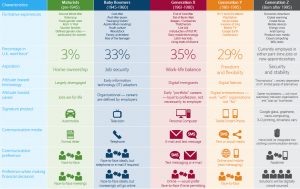
Who is Gen Y or Millennials?
The Millennial generation or Gen Y is transforming the nature of careers and the workplace. Their values, beliefs and life style are significantly different from the Baby Boomer generation. These differences will require organizations to adapt due to sheer numbers of Millennials who will dominate the workplace in the coming decade.
By 2020, nearly 50% of the U.S. workforce will consist of Millennials according to the U.S. Bureau of Labor Stastistics. Another study predicts nearly 75% by 2025. In Canada, the figures are 75% by the year 2028.
I’ve had the privilege of working with scores of young Millennials in the Vancouver Board of Trade’s Leaders of Tomorrow mentoring program, and I’ve found them to be passionate and driven to make a difference in the world, and confident they can assume the role of leaders early in their careers. And clearly they see their careers and the workplace very differently than current baby boomers.
Josh Berzin, an talent management expert, writing in Forbes magazine advises executives “Your ability to attract, develop, and retain young leaders will make or break your company in the coming years.” Berzin argues “The way we move people around, the way we appraise people, the types of rewards we provide…and how we think about careers all need to change. Many of these changes throw sand in the gears of HR.”
The Millennial generation has been widely characterized as the “me” generation—self-centered, lazy, and demanding–a reputation that is unbalanced and to some degree mud slinging by the predominant baby boomers, who upon close examination, haven’t done so well. One thing is clear, the Millennials will soon be in control of careers and the workplace, and they will change.
The “Lost Generation,” a term thought to be coined by Gertrude Stein, was the generation that came of age during WWI, and referred to young people whose prospects in life looked dim. The term was also used to refer to the generation of unemployed youth in the Great Depression. If that term can be applicable to today’s Generation Y, it’s in reference to their high aspirations yet what some would say are their dismal economic prospects. At the same time, it’s clear Gen Y has a very difficult set of values for work and life in general, compared to the Baby Boomers.
What Surveys Say About Millennials
Virtuali, a leadership training firm and consultancy, and WorkplaceTrends.com, a research and advisory membership portal servicing forward-thinking HR professionals, announced the results of a new survey entitled “The Millennial Leadership Study“. Following a national survey of 412 millennials, the study found that 91% of Millennials aspire to be a leader and out of that, 52% were women. Almost half of Millennials define leadership as “empowering others to succeed” and when asked what their biggest motivator was to be a leader, 43% said “empowering others”, while only 5% said money and 1% said power. When asked about the type of leader they aspire to be, 63% chose “transformational”, which means they seek to challenge and inspire their followers with a sense of purpose and excitement.
Other findings in the survey:
- 55% of Millennials said that the most important leadership skill is the ability to build relationships, which 66% said was one of their strongest skills;
- Millennials want to learn online and have mentors. When asked what type of training would be most effective for their development as a leader, 68% said online classes and 53% said mentoring. Only 4% of Millennials said University courses;
- Millennials prefer to have fewer managers. 83% of Millennials said they would prefer to work for a company with fewer layers of management.
- Millennials say that the biggest problems with their company’s leaders is their ability to develop others (39%) and communication (50%).
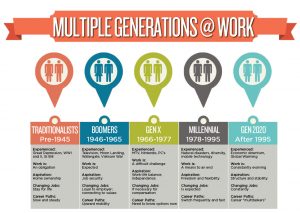
Sean Graber, Co-Founder and CEO of Virtuali said: “Millennials embody the shift in today’s workplace. They are motivated by a desire to transform themselves, their colleagues, and the world around them. This study confirms that Millennials respond and aspire to this type of transformational leadership. If companies want to build engaged and productive workforces, they will need to find a way to tap into the Millennial outlook.”
Dan Schawbel, founder of WorkplaceTrends.com says: “This study confirms that Millennials choose to empower others over making money or being recognized.” Schawbel goes on to say in my interview with him that “Millennials want companies to give back to society and make a difference instead of just making a profit. They aren’t fond of the command and control “autocratic” leadership style of boomers and want to encourage others to succeed.” When asked the question of the bottom-line for companies, Schawbel contends “Millennials want to align themselves with companies that have shared values. If a company can’t communicate how it benefits society, then it’s going to have trouble engaging Millennials. Millennial workers are most engaged when they are doing work that has meaning.”
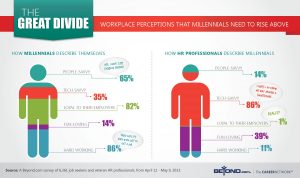
Kate Taylor, writing in Forbes, states, “The 9 to 5 job may soon be a relic of the past if Millennials have their way…Freelancing and self-employment are on the rise. Meanwhile 60% of Millennials are leaving their companies in less than three years at a cost to the organization of $20,000 per person to replace.”
A Millennial Branding study reported that 45% of Millennials will choose workplace flexibility over pay; 72% want to have a job where they can have an impact; and due to the impact of the recent recession and current high unemployment rate for young people, need economic security (according to a recent AP analysis, more than 53 percent of recent college grads are unemployed or underemployed). An MTV survey reported Millennials want more flexible hours and ability to work remotely with technology; they want to set their own hours and dress how they want; and they believe they can teach older workers and their bosses a thing or two.
According to Dan Schawbel, author of Promote Yourself: The New Rules for Career Success, and an expert on the Millennials, says “Millennials have a different view of how work should be done and what a company’s role should be in society. They want companies to give back to the community, to eliminate the traditional 9 to 5 workday collaboration,instead of isolation, and to create a organization fabricated by social media. Millennials, relative to older generations, are all about giving back to communities that align with their core values. They want to make a difference in a world.”
Emily Matchar, writing in the Washington Post, “The current corporate culture simply doesn’t make sense to much of middle-class Gen Y. Since the cradle, these privileged kids have been offered autonomy, control and choices… They’ve been encouraged to show their creativity and to take their extracurricular interests seriously. Raised by parents who wanted to be friends with their kids, they’re used to seeing their elders as peers rather than authority figures. When they want something, they’re not afraid to say so.”
Jay Gilbert, writing in the Ivey Business Journal, contends “Millennials are creating a change in how work gets done, as they work more in teams and use more technology. Their social mindset, however, is also a significant factor. As Leigh Buchanon writes in Meet the Millennials, ‘One of the characteristics of millennials, besides the fact that they are masters of digital communication, is that they are primed to do well by doing good. Almost 70 percent say that giving back and being civically engaged are their highest priorities.’”
A PWC study of Millennials, in collaboration with The University of Southern California, concluded, among other things, that organizations still embrace old models of work and talent and management, models that are inconsistent with the way Millennials want to work.
David Burstein, author of Fast Future: How the Millennial Generation Is Shaping Our World, and himself a Millennial, argues passionately, “Millennials are part of the quiet progression toward significant, scalable, and lasting change, and they are learning that they can do extraordinary things when they mobilize their peers … Millennials are trying to incorporate issues, causes and beliefs they are passionate about into busy, complex, multifaceted lives. Millennials are looking for sustainable commitments that can engage them and allow them to contribute to society.”
Todd G. Buchholz and Victoria Buchholz, writing in The New York Times, argue “sometime in the past 30 years, someone has hit the brakes and Americans—particularly young Americans—have become risk-aversive and sedentary.”
University of New Hampshire management professor Paul Harvey concluded from his research that Gen Y is characterized by a “very inflated sense of self” that leads to “unrealistic expectations” and “chronic disappointment.” This view was echoed by a study by Stacy Campbell of Kennesaw State University who says that when it comes to work, Gen Y wants high salaries and lots of leisure time.
In 2008, the renowned TV news program, 60 Minutes ran a story about Gen Y in the workplace described millennials as cynical, unaccustomed to hard work and having fragile egos because their childhoods filled with trophies and adulation didn’t prepare them for the cold realities of work.
Bruce Tulgan, the founder of Rainmaker Thinking and an expert on Generation Y, says that “they are a pampered and nurtured generation, being both high performance and high maintenance, with a very high sense of self-worth. Tulgan calls them “Generation X on steroids.”
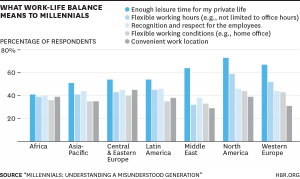
Robin Marantz Henig observed in The New York Times Magazine that Gen Y has pushed back each of the five milestones of adulthood: completing school, leaving home, becoming financially independent, marrying and having children.
We know from many studies and experts that Gen Y has grown up naturally collaborative, talented and open-minded, flexible and they thrive on social media, all characteristics well suited to the new economy. Gen Y demands only that the workplace reflect their values–personal growth; work that is meaningful and family first. The 2006 Cone Millennial Case Study concluded that a large majority of Gen Y want to work for companies that care about and contribute to society, and would refuse to work for an irresponsible company.
Gen Y sees what is known as the American Dream or middle class dream as less about money and more about living a fulfilling, meaningful life. When asked in the 2011 MetLife Study of the American Dream what was more important to them, 33% said “close family and friends,” compared to only 23% who said “having a roof over your head.”
In an article in the Bloomberg News, Elliot Blair Smith contends “Generation Y professionals entering the U.S. workforce are finding careers that were once gateways to high pay and upwardly mobile lives turning into detours and dead ends.” Cliff Zukin, a Rutgers University professor and senior research fellow argues “This generation will be on the lower path of income for probably all of their life—and at least the next 10 years.” Michael Greenstone, who was the Chief Economist at the White House Council of Economic Advisors in 2009-10 says the shift to a downwardly mobile society may be lasting.
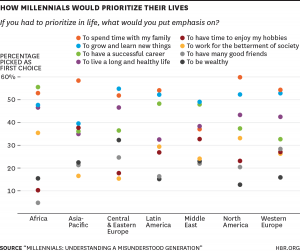
According to The Wall Street Journal, almost 300,000 Americans with college degrees were working in minimum wage jobs, which constitutes 70% more than 10 years ago. Nearly 50% of the college graduate in the class of 2010 are working in jobs that don’t require a college degree. Recently McDonalds issued a recruitment advertisement asking for applicants to have college degrees.
No group in America has been hit harder during recent tough economic times than young adults. Millions of them are graduating from college with virtually no money, lots of debt and very dim employment prospects. According to the U.S. Bureau of Statistics, the national rate of unemployment for Americans 25 and younger is almost 19%. According to the Pew Research center, approximately 37% of the Americans between the ages of 18 and 29 have either been unemployed or underemployed at some point during the recession. The Pew Center also reported that only 61% of Americans between the ages of 18 and 29 are covered by some kind of health plan. A poll for Sun Life Financial Canada found 90% of people aged 18-24 reported feeling excessive stress because of economic instability and underemployment.
Gen Y and Leadership
A report by the Center For Creative Leadership (CCL) by Jennifer Deal and Regina Eckert dispelled some myths about Millennials including: they care more for compensation than previous generations; they are disrespectful of authority; and they aren’t loyal, showing the data does not support those myths. The report underscored the importance of firms find cost-effective ways to train Millennials, particularly through the use of technology. The report also emphasized the importance of coaching and mentoring for Millennials, which provides opportunities for face-to-face personal growth.
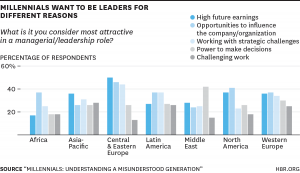
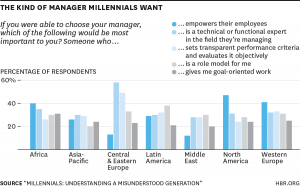
Josh Bersin, writing in Forbes, reviewed a global study by Deloitte on Millennials. Among the conclusions Bersin provides are the following:
- “Millennials want leadership and they want it their way;”
- Millennials desperately want to acquire leadership skills;
- Millennials value an “open, transparent and inclusive leadership style;”
- Millennials want rapid career growth;Millennials “thrive on fairness and performance-based appraisal, not tenure.”
- Bersin concludes his article : “It’s clear from our work with many companies that things need to change…Today’s Millennials will definitely rule the world. Our job now is to make our organizations ready, so they can slip right into place and help us lead our businesses in their own special way.”
Mara Swan, executive vice president of global strategy at human resources consultancy ManpowerGroup, says Gen Y’s perceived skepticism toward traditional corporate structures should make them more democratic in their approach as leaders. Dropping command-and-control leadership models in favor of more collaborative, collective organizational reporting orders is likely to be a defining hallmark.
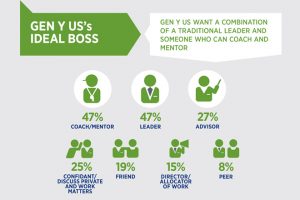
“It’s going to be much more horizontal,” Swan said. “They don’t think of power as being something to warrant; they think about sharing it.” With respect to leadership development “We have to stop one-way learning,” said ManpowerGroup’s Swan. “You have to talk about what you want them to do, and you have to let them experience it and teach each other. The instructor has to move from an instructor to a facilitator of learning, and it has to be very experiential. I also think learning has to be tied to the purpose of the company vs. the task you’re trying to teach.”
The Millennial Compass Report completed by the MLS Group and the Ashbridge Business School in the U.K. entitled “Truths About the 30-and-under Generation in the Workplace,” concluded Millennials “are focused on achieving through personal networks and technology; having good work-life balance; and getting high levels of support from their managers. They don’t want to be tied to an organization, a timetable, or a hierarchy, and they’d rather avoid the stress they see their senior leaders shouldering.”
These reports show Millennials’ different attitudes and expectations towards work and careers compared to the current dominant Baby Boomers. Also clear is Millennials’ definition of loyalty to the organization and expectations for frequent career or job changes. Millennials have a very different perspective and expectation of the role and behavior of managers, seeing them more in an encouraging, coaching, and peer capacity, something that is currently at odds with the current generation of Baby Boomer managers who see their role as one associated more with power and position.
Kyle Borchardt, co-founder and chief operating officer of Virtuali, noted that millennials’ desire for leadership roles, especially as entry-level employees, has contributed to their reputation as “entitled” in the eyes of older generations. But as the survey shows, Gen Y professionals aren’t necessarily seeking a senior title out of the gate; they just want to feel empowered to lead
“[Millennials] don’t really view titles as a determination of leadership,” Borchardt told Business News Daily. “They can be leaders whether or not they have a vice president or director title. The traditional hierarchy of leadership is dated — organizations with a flatter structure have better [career] development, higher engagement and better leadership.”
The reason this generation is so eager to take on leadership roles so early in their careers is because they truly want to make a difference in all aspects of their lives, said P.J. Neal, senior product manager at Harvard Business Publishing (HBP) and lead developer of HBP’s New Leader Program. “Employers should work to develop leadership capabilities and a leadership mindset in millennials early in their careers, so they are ready to step up sooner into more senior roles. [First,] deliver small learning experiences at regular intervals, stretching the learning out over weeks and months. This will increase impact and behavior change best and ensure the learning sticks with employees well after the program is completed. Second, have employees practice new skills on an actual job they need to do and then bring that experience back into the development program. Third, make sure to build in reflection. Taking time to reflect on what you just did, or what you just learned, has been shown to increase knowledge retention and improve behavior change,” says Neal.
“Any way you look at it, millennials want to have an impact,” Neal said. “In the workplace, this manifests itself as an employee who wants to understand the big picture — your strategy, roadmap, market, client needs, etc. — and to link his or her individual performance to those broader goals. Organizations need to harness the enthusiasm of this generation of leaders, rather than being put off by it.”
Millennials consistently rate leadership development among the most important employer benefits. At the same time, they expect it to be delivered differently from that to Baby Boomers, expecting it to be highly individualized and on-demand and experiential in nature. More than 60% of the respondents indicated companies are not providing sufficient leadership training.
It will be difficult for employers to keep top talent if there aren’t additional incentives based outside job titles and financial compensation, respondents reported.
Ninety-five percent of Millennials surveyed aspire to be leaders in their careers, despite the fact that less than 50% have found leadership roles. Why? Because they have a more egalitarian perspective. They see leadership not as an organizational chart or direct reports, but rather as relationships , networking and developing others, regardless of titles.
Millennials value people-centric leadership, underscoring the importance of communication and relationship skills, and place less value on “hard skills” such as technical competence or industry knowledge.
Millennials identified coaching and mentoring as the most important developmental activities by a wide margin, which emphasizes also the importance of experiential learning.
Deloitte has released a report, “Mind the Gaps: The 2015 Deloitte Millennial Survey.” The study collected the view of more than 7,800 Millennials representing 29 countries. Among the conclusions of the report were the following:
- Millennials believe that business needs to “reset” in terms of paying as much attention to people and purpose as it does to products and profit;
- More than 7% of those surveyed believe businesses should have a positive impact on society first;
- Millennials want to know that businesses are acting ethically and in accordance with their own values;
- Millennials view leadership in a way that runs contrary to how they see it today; they would like to see leaders place a higher priority on employee well-being and development rather than financial rewards;
- Millennial women place a higher value on employee well-being than Millennial men.
Deloitte’s latest Millennial Survey titled ‘Winning over the next generation of leaders’, the survey unearths information pivotal for anyone who is hiring millennials, working with millennials or promoting millennials. If Gen Y are to be the future leaders of both existing and not yet conceived industries, forward thinking organizations need to be strategizing now about how to gain their attention and maintain it beyond the pivotal two year mark indicated by Deloitte’s research. The report points to the fact that millennials are less likely to wish to stay or lead in an organization that doesn’t support their values or doesn’t make active choices to support them as an individual within the organization. The report makes some suggestions on how organizations can take steps to retain Gen Y leaders, among which are:
- Focus on team building to foster greater loyalty. While many millennials will still feel loyalty towards an organization, increasingly more are reporting loyalty as a result of being in a team that is productive and like-minded. There is a greater responsibility than ever for team leaders and department heads to consciously and proactively develop and maintain team cohesion. By using this to your advantage and focusing on building strong teams with enhanced interdepartmental interaction, you will be encouraging bonds to be made that are focused on group achievement and team directed innovation.
- Encourage a mentoring program amongst millennial staff. Mentoring doesn’t have to necessarily be between staff of different generations, it also has a place between millennial team members. For the mentor, the opportunity to demonstrate their values as they see them operate within the organization will solidify their own position and reasons for remaining loyal to their team and mentee. For the mentee, they will have a light of influence to look to who can directly relate to their perspective and ideals, but can also facilitate the alignment of these values alongside those of the organization.
- Demonstrate the organization’s values in action.
Millennials, particular those in more senior positions, are no longer just looking for that foot in the door. They are looking for purpose in their work and in the organisation they work for. Authenticity and the demonstration of this from their organization is perhaps the greatest retention strategy for millennials in any industry. Don’t just talk the talk, walk the walk wherever and whenever you get the opportunity to. Millennials want to contribute to the positive impact they believe business has on a society, but in doing so they wish to hold onto their own beliefs while achieving those of the organisation. Knowing this, current leaders can start to initiate change in their organisation to support these desires of their millennial team members and leaders.
It’s clear that Millennial or Gen Y will have a significant impact on the workplace just from the perspective of their large numbers. But also because their values about work-life, leadership and the purpose and impact of business on society and the world is of great importance to them.
And while progressive companies such as Google have taken positive steps to address the issues mentioned, most employers have yet to come to terms with how the Millennial generation is on the cusp of drastically changing how we view work and business. And may end up doing so at the cost of insufficient talent strategies and retention problems.
My Personal Experience with Gen Y
I’ve had the opportunity to coach and consult current leaders of organizations, most of whom are Baby Boomers, and a significant number of them express frustration and concern with Gen Y, because they don’t share the same perspectives about work and life. The realistic current leaders, who understand that Millennials will soon make up between 50-75% of the workforce, are changing and adapting their workplace processes and structures to not just accommodate the new generation, but harness Millennials’ passion for innovation and technology and more collaborative leadership style.
Read my latest book: Eye of the Storm: How Mindful Leaders Can Transform Chaotic Workplaces, available in paperback and Kindle on Amazon and Barnes & Noble in the U.S., Canada, Europe and Australia


